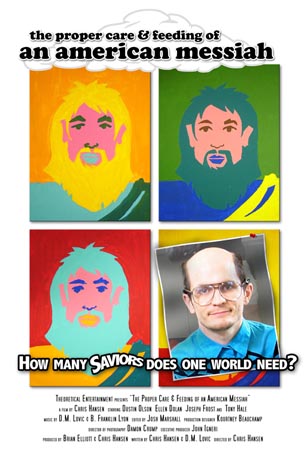Clean Freak Trailer (on Vimeo)
I decided to put the trailer for Clean Freak up on Vimeo as well -- the video quality on this site is much higher:
Clean Freak - Trailer from Chris Hansen on Vimeo.
Clean Freak - Trailer from Chris Hansen on Vimeo.



11 Comments:
Great trailer. I have visions of myself picking up sock lint off the bathroom floor this morning. When can we see the real deal?
By the way, there may be at least a minimal coralation between the amount of money you spend on a film and whether it is a great art film. I say this because the film medium does carry with it certain costs: film, equipment, time, people. To make a truly great art film, you may need a certain amount of money--what that might be, I have no idea.
Thanks -- I am trying to figure out when/where to screen it locally. It's still "out on the festival circuit" too (er, "just getting onto the circuit" is more like it)...
As for films and cost -- no doubt there has to be some correlation. I don't know that we'd be able to put a specific amount on it, but I really do wonder if a truly transcendent work of film art can be made on a truly modest budget. The visuals -- that which makes it truly transcendent, in many ways -- cost money.
Not to throw a monkey-wrench into the works, but might the problem be that film is an industry? In other words, it's the "film-industry" that occasionally (but pretty rarely) produces filmic art. When the individual artist starts thinking about making a film, he/she is always already thinking about how to break into an industry (which makes the whole venture different than Picasso thinking "what could I paint Today that would really annoy everyone?") Just saying.
That's not *A* monkey; it's THE monkey, and I agree. How can you make art within a business context? Can you? Or do you make it IN SPITE OF the business when you have the power to do so? Picasso is a good example (side note: don't you think he became aware of the commercial side of his work at some point, too? Not that he bowed down to it, but he must've been aware of the commercial value of his work to people).
I agree about "the" monkey. Film is an industry, and a very weird industry at that. Imagine, Jessica Alba and Sylvester Stallone are stars in this industry. I'm going to go back and read Walter Benjamin's "Work of Art in the Age of Mechinical Reproduction" which goes to the heart of art as industry. It is worth reading a second time.
Medievalist is certainly correct about the Benjamin piece. In fact, I was thinking of that--and of Theodor Adorno's essay (of around 1947) "The Culture Industry."
Medievalist -- I laughed out loud at the Alba/Stallone comment. Not exactly Picassos, are they? I need to read Benjamin's book and the Adorno essay (thanks for that suggestion, mad prof).
I've heard of both but never had occasion to read them (er, never got off my lazy butt to read them? -- hey, I was seeing movies...)
Interesting point re: actors, though. The collaborative nature of film is part of the problem and a real jab at the auteur theory. I'm trying to teach my students this semester about these very challenges. The studio has a great degree of control over the final product. If they cast Keanu Reeves because he'll bring in audiences, the relative deficiencies in his acting abilities are an issue for the artistic side.
(There goes any hope of ever working with Keanu Reeves in the future.
Not that I'm altogether upset about that.)
What? You're not on-board for "Bill and Ted's Bogus Adventure--The Sequel"? Although I don't like all of Woody Allen's movies (I like most of them), he tends to hire actors who are both popular and real actors. He's not always right, but he can cast a big name, and usually said big name can also act. "Crimes and Misdemeaners" would be a good example of that. Note, Keanu has never worked for Allen. Just a thought. ("Relative deficiencies"--that's really funny.)
Bogus Adventure actually has some wonderfully absurd moments in it -- the entire sporting competition with Death is brilliant comedy.
Woody Allen can somehow manage to get actors to work with him/for him for almost nothing (compared to their normal fees). He earned that by making small films that people respected, of course.
And Crimes and Misdemeanors is one of my all-time favorites -- not just of Allen's (I think it's his best) but of all time. Wonderful mixture of tones and genres...
But don't you think that Bogus Adventure works in spite of Reeves? Or maybe it works because of him, irony of ironies.
I have copies of two Allen films and they changed the way I look at movies: Manhattan and Crimes. In 1980 when Manhattan came out, it really blew me away. Between the music, story and cinematography, it ruined me for life. I can't sit through half the "crap" that Hollywood produces. I am a huge Gershwin fan, I treasure b & w cinema, especailly the comedies of the 30's, and the weird dramas of the fifties, including Dr. Strangelove (Kubrick, early 60's) or Manchurian Candidate from 1963.
And C & M blew away all of my ideas about storytelling: the guy does not get the girl, the idiot does; the bad guy gets away with murder and even looks good doing it; a philosopher committs suicide; a man goes blind. It had a profound impact on the way I watch all movies.
Whether in spite of or because of, Bogus Adventure works in part (for me anyway) but not as a whole. Really, it has some wonderful absurdities in it, but some of it is just plain bad.
Sounds like we like a lot of the same films. Allen's stuff from that period is quite good (I like Stardust Memories, too -- his version of Fellini's 8 1/2, which is one of my favorites). Pretty much everything Kubrick did is amazing (Clockwork Orange being in my top 10 of all time).
All the things you cite about C & M are why I like it, too. Breaks every rule and ends up being one of the best films of its kind (if you can define what kind of film it is!).
Post a Comment
<< Home